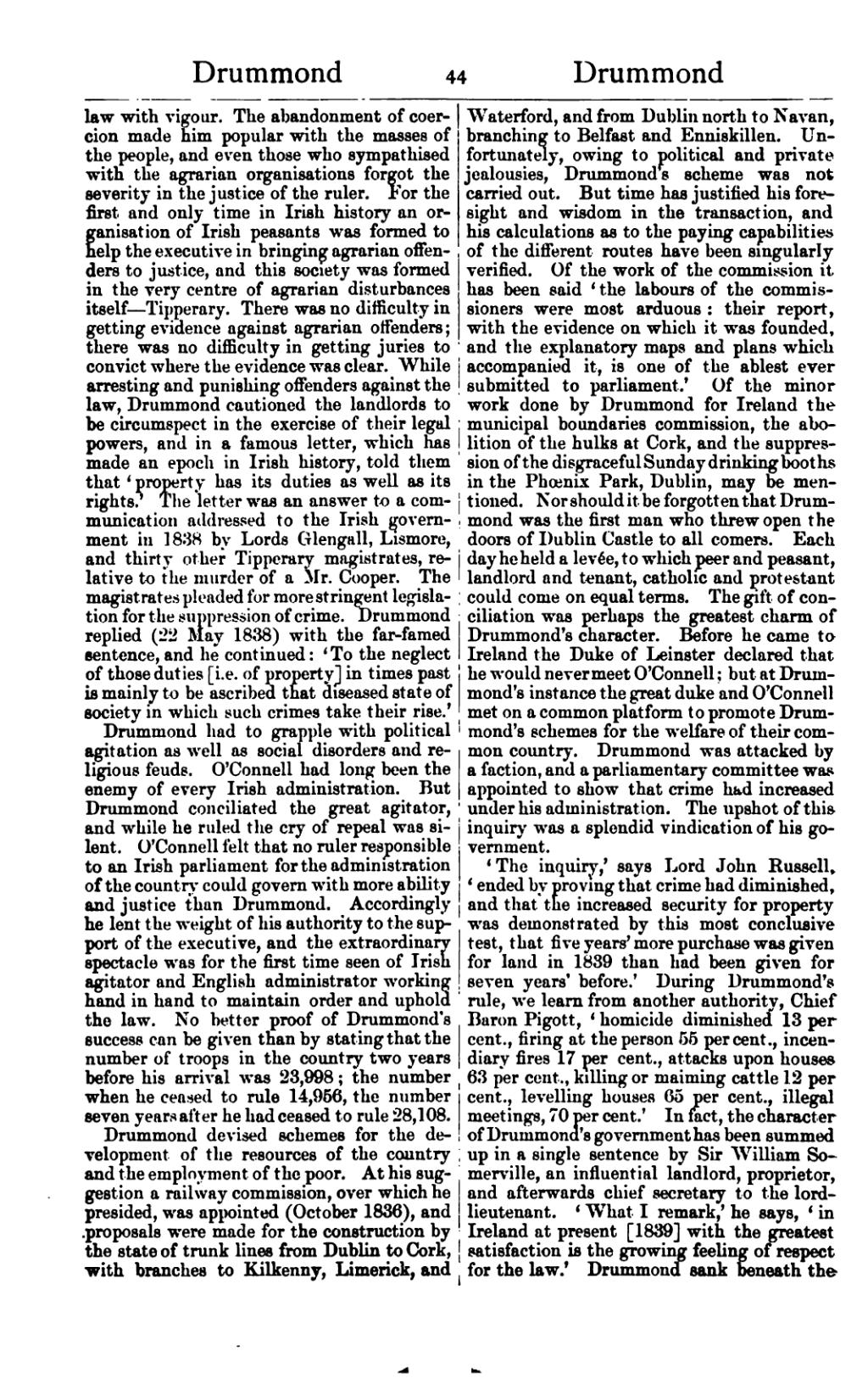law with vigour. The abandonment of coercion made him popular with the masses of the people, and even those who sympathised with the agrarian organisations forgot the severity in the justice of the ruler. For the first and only time in Irish history an organisation of Irish peasants was formed to help the executive in bringing agrarian offenders to justice, and this society was formed in the very centre of agrarian disturbances itself—Tipperary. There was no difficulty in getting evidence against agrarian offenders; there was no difficulty in getting juries to convict where the evidence was clear. While arresting and punishing offenders against the law, Drummond cautioned the landlords to be circumspect in the exercise of their legal powers, and in a famous letter, which has made an epoch in Irish history, told them that ‘property has its duties as well as its rights.’ The letter was an answer to a communication addressed to the Irish government in 1838 by Lords Glengall, Lismore, and thirty other Tipperary magistrates, relative to the murder of a Mr. Cooper. The magistrates pleaded for more stringent legislation for the suppression of crime. Drummond replied (22 May 1838) with the far-famed sentence, and he continued: ‘To the neglect of those duties [i.e. of property] in times past is mainly to be ascribed that diseased state of society in which such crimes take their rise.’
Drummond had to grapple with political agitation as well as social disorders and religious feuds. O'Connell had long been the enemy of every Irish administration. But Drummond conciliated the great agitator, and while he ruled the cry of repeal was silent. O'Connell felt that no ruler responsible to an Irish parliament for the administration of the country could govern with more ability and justice than Drummond. Accordingly he lent the weight of his authority to the support of the executive, and the extraordinary spectacle was for the first time seen of Irish agitator and English administrator working hand in hand to maintain order and uphold the law. No better proof of Drummond's success can be given than by stating that the number of troops in the country two years before his arrival was 23,998; the number when he ceased to rule 14,956, the number seven years after he had ceased to rule 28,108.
Drummond devised schemes for the development of the resources of the country and the employment of the poor. At his suggestion a railway commission, over which he presided, was appointed (October 1836), and proposals were made for the construction by the state of trunk lines from Dublin to Cork, with branches to Kilkenny, Limerick, and Waterford, and from Dublin north to Navan, branching to Belfast and Enniskillen. Unfortunately, owing to political and private jealousies, Drummond's scheme was not carried out. But time has justified his foresight and wisdom in the transaction, and his calculations as to the paying capabilities of the different routes have been singularly verified. Of the work of the commission it has been said ‘the labours of the commissioners were most arduous; their report, with the evidence on which it was founded, and the explanatory maps and plans which accompanied it, is one of the ablest ever submitted to parliament.’ Of the minor work done by Drummond for Ireland the municipal boundaries commission, the abolition of the hulks at Cork, and the suppression of the disgraceful Sunday drinking booths in the Phœnix Park, Dublin, may be mentioned. Nor should it be forgotten that Drummond was the first man who threw open the doors of Dublin Castle to all comers. Each day he held a levée, to which peer and peasant, landlord and tenant, catholic and protestant could come on equal terms. The gift of conciliation was perhaps the greatest charm of Drummond's character. Before he came to Ireland the Duke of Leinster declared that he would never meet O'Connell; but at Drummond's instance the great duke and O'Connell met on a common platform to promote Drummond's schemes for the welfare of their common country. Drummond was attacked by a faction, and a parliamentary committee was appointed to show that crime had increased under his administration. The upshot of this inquiry was a splendid vindication of his government.
‘The inquiry,’ says Lord John Russell, ‘ended by proving that crime had diminished, and that the increased security for property was demonstrated by this most conclusive test, that five years' more purchase was given for land in 1839 than had been given for seven years' before.’ During Drummond's rule, we learn from another authority, Chief Baron Pigott, ‘homicide diminished 13 per cent., firing at the person 55 per cent., incendiary fires 17 per cent., attacks upon houses 63 per cent., killing or maiming cattle 12 per cent., levelling houses 65 per cent., illegal meetings, 70 per cent.’ In fact, the character of Drummond's government has been summed up in a single sentence by Sir William Somerville, an influential landlord, proprietor, and afterwards chief secretary to the lord-lieutenant. ‘What I remark,’ he says, ‘in Ireland at present [1839] with the greatest satisfaction is the growing feeling of respect for the law.’ Drummond sank beneath the
